With the return of wet weather in the fall, the risk of leptospirosis increases for our dog patients.
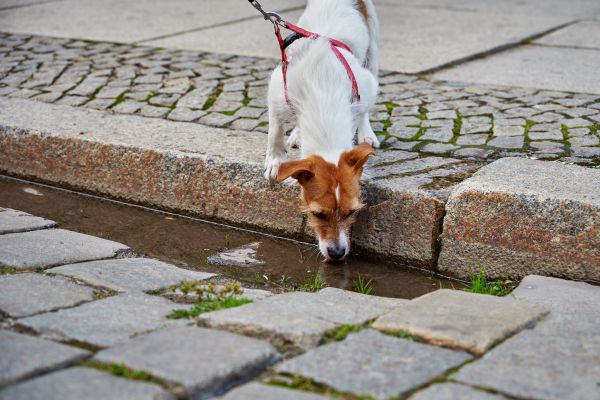
What is leptospirosis?
Leptospirosis is a zoonotic disease, meaning it can be transmitted between animals and humans. This bacterial disease can affect dogs, humans, livestock, and wildlife.
The spiral-shaped organisms, called Leptospira, are found worldwide and thrive in in both rural and urban areas, including lakes, streams, puddles, vegetation, and mud. Even fenced yards can be contaminated by bacteria-carrying mice, rats, squirrels, raccoons, deer, and livestock.
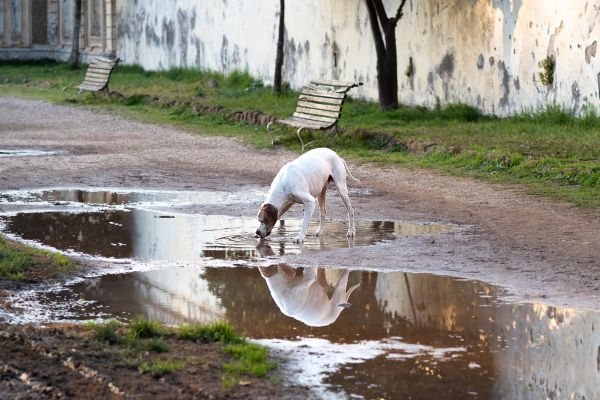
The bacteria can live in the kidneys and bloodstream of infected animals, and are shed in their urine.
How do dogs become infected with leptospirosis?
Dogs can become infected with leptospirosis by coming into contact with contaminated water, soil, urine, food, or through bites from infected animals.
Drinking contaminated water: Leptospires can survive in water for weeks or months, so even stagnant or muddy puddles can be a source of infection.
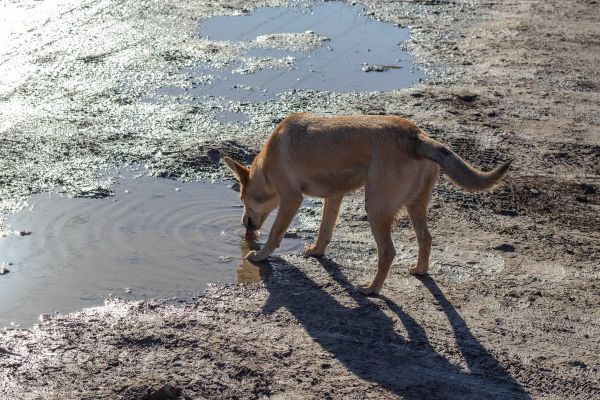
Swimming in contaminated water: Leptospires can also be present in swimming pools, lakes, and rivers.
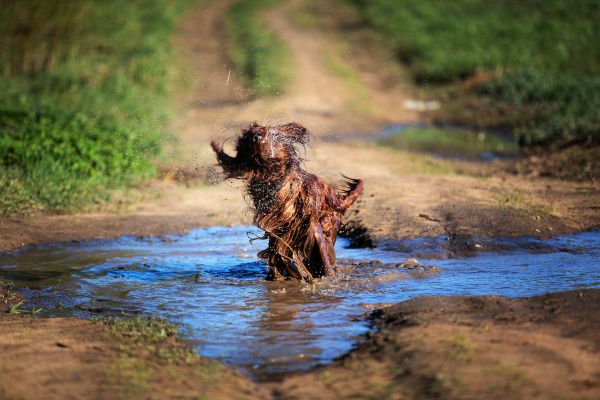
Walking through contaminated soil.
Eating or licking contaminated food or objects.
Coming into contact with the urine of an infected animal: Leptospires can enter the body through cuts or abrasions in the skin, or through the eyes or nose.
How to spot leptospirosis in your dog
The early signs of leptospirosis in dogs can be vague and easily mistaken for other illnesses.

The symptoms can vary depending on the severity of the infection – some dogs show no symptoms at all, while others may experience a range of signs, including:
- Fever: A persistent and unexplained fever is one of the most common signs of leptospirosis.
- Loss of appetite: Infected dogs may exhibit a sudden decrease in appetite or refusal to eat.
- Weakness and lethargy: Infected dogs may become weak, appear lethargic, and display a lack of interest in their usual activities.
- Muscle pain: Leptospirosis can cause muscle pain, leading to reluctance to move, limping, or stiffness.
- Vomiting and diarrhea: Some dogs with leptospirosis may experience gastrointestinal symptoms such as vomiting and diarrhea.
- Increased thirst and urination: Since the disease affects the kidneys, infected dogs may appear thirsty and may urinate frequently.
Other symptoms of leptospirosis may include:
- Jaundice (yellowing of the skin and eyes)
- Headache
- Abdominal pain
- Eye pain
- Cough
- Bleeding gums
- Difficulty breathing
- Bleeding
If you notice any of these symptoms in your dog, consult your veterinarian right away. Early diagnosis and treatment with antibiotics and intravenous fluids increases the chances of a dog’s recovery. Untreated animals or animal treated too late often die.
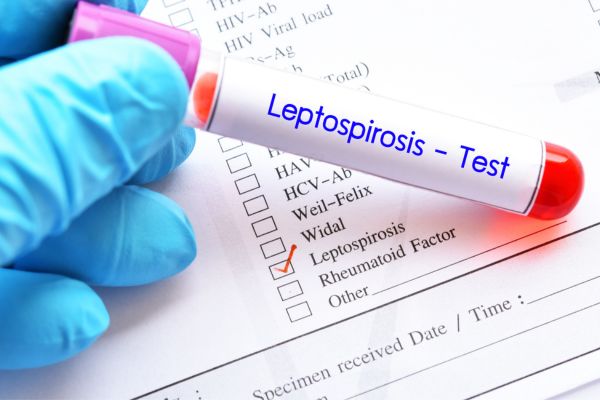
8 ways to protect your dog from leptospirosis
There are a number of practical things you can do to protect your dog:
1. Vaccinate your dog yearly during your pet’s annual comprehensive exam. There are several vaccines available that can help protect your dog from leptospirosis. Ask your veterinarian which vaccine is right for your dog, based on your dog’s lifestyle and risk factors. Although the vaccine doesn’t protect against all strains of leptospirosis, it does provide protection against the most common ones.
2. Keep your dog away from stagnant water. If you live in an area where leptospirosis is common, avoid letting your dog drink from stagnant water or swim in contaminated water. This includes water from puddles, ponds, lakes, and streams.
3. Avoid letting your dog walk through contaminated soil. This includes soil that has been used as a toilet by wildlife.
4. Clean and disinfect any areas where your dog has been exposed to contaminated water or soil.
5. Disinfect your dog’s bedding and toys regularly. If your dog comes into contact with contaminated water or soil, be sure to disinfect their bedding and toys as soon as possible.
6. Keep your dog’s yard clean. If your dog has access to a yard, keep it clean and free of debris. This will help prevent the buildup of bacteria that can cause leptospirosis. Be sure to properly dispose of pet waste!
7. Control rodents around your property. Keep garbage bins tightly closed, limit access to food sources, and consult a professional pest control service if needed.
8. Keep your dog’s nails trimmed short. This will help to prevent cuts and abrasions that could allow the bacteria to enter the body.
5 ways to protect yourself from leptospirosis
While the focus of this article is mainly on protecting dogs from leptospirosis, it is essential to take precautions to protect yourself as well. That’s because leptospirosis can be transmitted from dogs to humans (even though it happens rarely).
Here are some measures you can take:
1. Vaccinate yourself. There is a vaccine available for humans that can help protect you from leptospirosis. Talk to your doctor about whether the vaccine is right for you.
2. Wash your hands frequently and thoroughly with soap and water after handling your dog, especially if your dog has been in contact with contaminated water or soil, or if you have had contact with your dog’s urine.
3. Avoid contact with contaminated water. If you are in an area where leptospirosis is common, avoid ingesting, wading in, or swimming in natural bodies of water that may be contaminated with leptospirosis.
4. Wear long sleeves, gloves, and boots when handling animals that may be infected with leptospirosis and when cleaning up animal waste, to protect yourself from contact with their urine. Also wear gloves and boots when gardening or working in areas where there may be contaminated soil.
5. If you are bitten by an animal, seek medical attention immediately.
Treatment for leptospirosis
Leptospirosis is a potentially deadly disease that can affect both dogs and humans. To decrease the risk of infection, stay vigilant: Get your dog vaccinated annually, avoid contaminated water and soil, and practice good hygiene.
If you think you or your canine companion may have been exposed to leptospirosis, it is important to see a doctor or veterinarian right away.
Leptospirosis is treatable with antibiotics. The sooner treatment is started, the better the chances of a full recovery.


